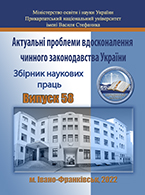Theoretical And Methodological Basis Of Research Of Corruptional Criminal Offenses Committed In Accident
DOI:
https://doi.org/10.15330/apiclu.58.168-176Keywords:
corruption criminal offenses, complicity in the commission of a crime, crime, criminal offense, criminal liability, theoretical and methodological foundations, methods of scientific research, scientific research methodology, methodology of scientific researchAbstract
The article focuses on the theoretical and methodological foundations of corruption criminal offenses committed in complicity. In terms of the use of specific methods of scientific research, the author concludes that corruption criminal offenses committed in complicity are a rather complex, multifaceted, comprehensive phenomenon from the philosophical and legal point of view, and their study requires a comprehensive methodological framework. The author establishes that methodological approaches make it possible to define corruption criminal offenses as an integral phenomenon of legal reality. It is concluded that the study of corruption criminal offenses committed in complicity in the process of philosophical and legal analysis necessitates the use of philosophical methods which characterize its independent nature and dynamism of development; general scientific methods, which focus on the historical nature of this legal phenomenon, its objectivity, and functional purpose; special methods that depict corruption criminal offenses committed in complicity as a systemic, structured phenomenon that has its own content, form, structure, and is in some way improved in accordance with the needs and interests of society and the state.The methodology for studying corruption criminal offenses committed in complicity will consist of such philosophical and general logical methods as systematization and generalization, terminological principle, dialectical method, comparison, deduction, axiological, hypothetical method, method of analysis and synthesis, abstraction, systemic method, principle of general connection and interdependence, historical, logical and comparative legal methods, systemic and structural method, modeling method and statistical method.


